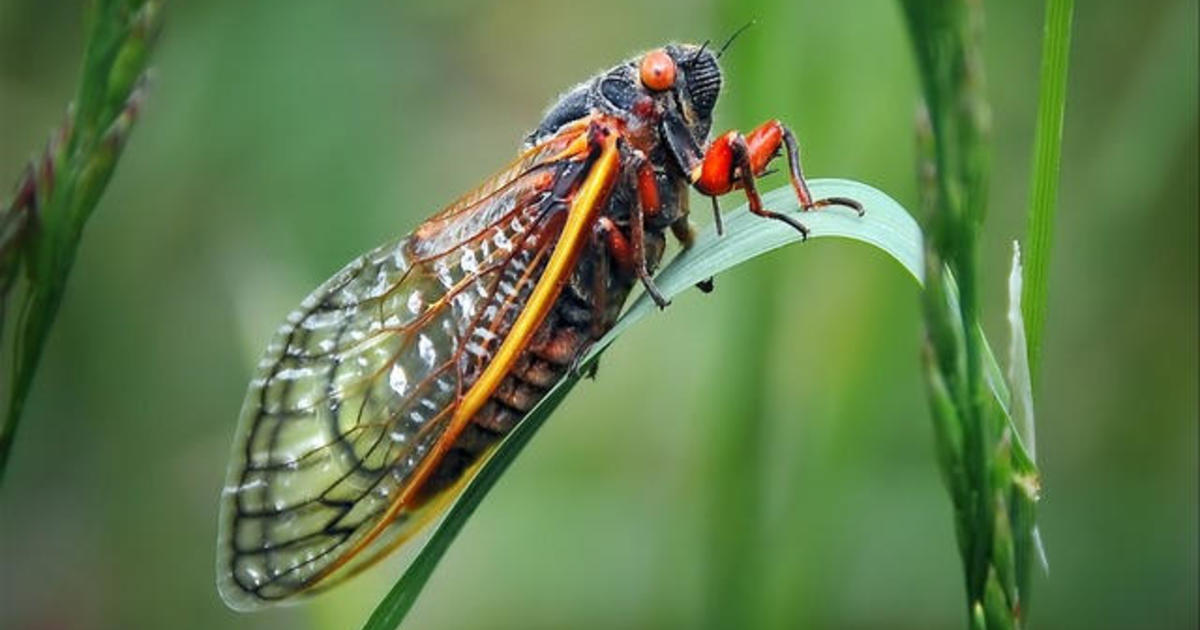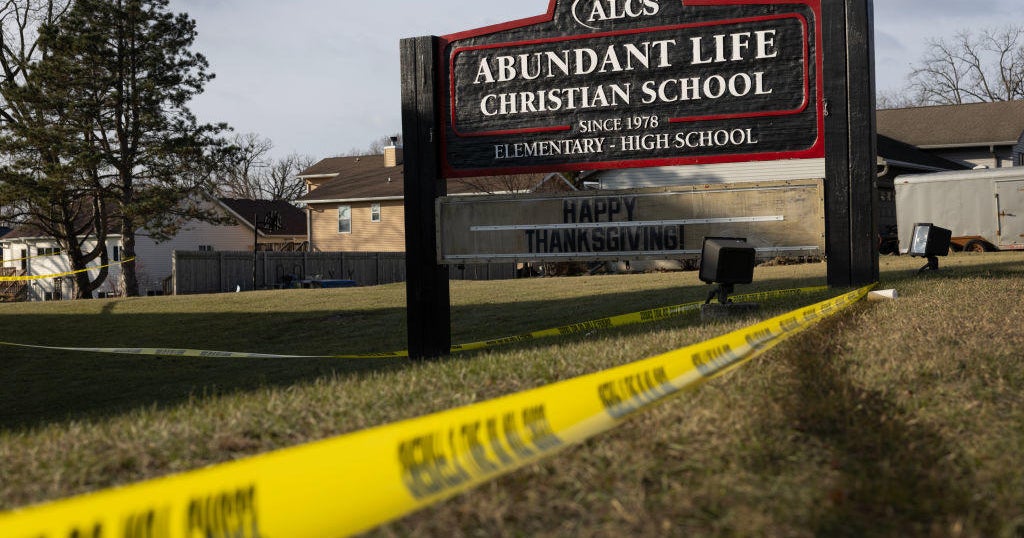CBS News
Periodical cicadas will emerge in 2024. Here’s what you need to know about these buzzing bugs.

Periodical cicadas aren’t present every spring, but when they do emerge, they come in loud, buzzing hordes. This year, trillions of these beady-eyed bugs are expected to appear in several U.S. states. Here’s what you need to know about cicadas.
Periodical cicadas
There are two types of periodical cicadas — ones that come out every 13 years and ones that come out every 17 years. They emerge in broods, which are labeled with Roman numerals.
In 2024, two broods will emerge: Brood XIX, which is on a 13-year cycle, and Brood XIII, which is on a 17-year cycle. These two broods haven’t matched up since 1803, according to research from the University of Connecticut.
Brood XIX will emerge across parts of the Midwest and Southeast, while Brood XIII will primarily be seen in Illinois.
Cicadas emerge from underground once the soil reaches 64 degrees, cicada expert Matthew Kasson told CBS News. So cicadas in South Carolina might emerge in April, when temperatures start to warm up there, while those in cooler climates like the upper Midwest might not emerge until June.
In 2024, they are expected sometime in May or early June, depending on the location, according to Ken Johnson, a horticulture educator at the University of Illinois.
How long do cicadas live above ground?
Cicadas spend the vast majority of their lives underground and come out at the end of the 13 or 17-year cycle. When they emerge, their job is to reproduce.
To attract mates, male cicadas start buzzing loudly — which is why the presence of cicadas is accompanied by a loud droning sound. They start this process about four to five days after they emerge, according to Johnson.
The females will flick their wings to signal to the males they want to mate, Kasson said.
Creative Touch Imaging Ltd./NurPhoto via Getty Images
The females lay their eggs in woody plants, using their ovipositor, or egg-laying organ, to inject about 10-20 eggs into branches. Females can lay around 500 to 600 eggs, Johnson said.
The eggs hatch about six weeks after they’re laid, and the babies fall to the ground, eventually digging themselves into the soil, where they will remain for 13 or 17 years.
Their parents, however, die shortly after the mating process, lasting only about a month above ground.
Are cicadas dangerous?
While the emergence of trillions of bugs from the ground may seem apocalyptic, cicadas pose no threat to humans or other animals.
However, they molt when they emerge, leaving behind their crusty exoskeletons. And when they die, they can smell like roadkill, according to Johnson.
Wildlife like birds or snakes may eat cicadas, and it typically ins’t dangerous to do so.
Johnson warns against using insecticides to try to keep cicadas away from plants, because they aren’t effective, and animals that eat cicadas could be harmed by the chemicals.
Can you eat cicadas?
Humans can also eat cicadas, Johnson says. They are best eaten as adults after they have molted but before their exoskeleton hardens. People who are allergic to shellfish should avoid eating cicadas.
Some cicadas. however, could be infected with a sexually transmitted fungus called Massospora cicadina, Kasson told CBS News. It is unclear what the fungus does to organisms who eat infected cicadas.
Matthew Kasson
The fungus takes over a third of the cicada’s body, replacing it with a chalky plug. Their genitals fall off and they become hyper-sexual — even though they can no longer reproduce.
These so-called “zombie cicadas” continue about their normal routines, despite being taken over by a fungus, Kasson said.
“We know that a lot of animals are gobbling these cicadas up as they’re emerging — snakes and birds. Is it possible they’re having an effect on the animals that eat them? Yes, it is possible.” But, he said, less than 5% of cicadas are infected with the fungus and researchers have yet to observe any impact on other wildlife.
What do cicadas eat?
Cicadas use trees and bushes to get nutrition. They pierce small twigs and withdraw minerals and some carbohydrates from the water in plants, according to experts at the University of Wisconsin La Crosse.
Johnson advises not planting any new trees ahead of a periodical cicada emergence, because cicadas can damage them. If you do have small trees and shrubs, you can put netting around them to keep cicadas away — just make sure openings are no larger than 1/4 of an inch so the bugs can’t get in.
Are cicadas locusts?
Contrary to popular belief, cicadas are not “plague locusts.” They’re not even locusts, which are known to eat plants.
“People really shouldn’t worry. Cicadas are not defoliating insects and have nothing to do with locusts,” says Sandy Liebhold, research entomologist with the Forest Service’s Northern Research Station in Morgantown, West Virginia. “They won’t eat your plants, vegetables, or even the leaves of trees. They are emerging only to mate and lay eggs.”
Most of the trees cicadas eat will be fine, according to Purdue University.
CBS News
12/18: The Daily Report – CBS News

Watch CBS News
Be the first to know
Get browser notifications for breaking news, live events, and exclusive reporting.
CBS News
Teacher, student killed in Wisconsin school shooting identified

A teacher and student killed in a shooting earlier this week at a school in Madison, Wisconsin, were identified Wednesday by authorities.
The Dane County Medical Examiner’s Office said in a news release provided to CBS News that 42-year-old Erin West and 14-year-old Rubi Vergara were fatally shot Monday morning at Abundant Life Christian School.
Preliminary examinations determined the two died of “homicidal firearm related trauma.” Both were pronounced dead at the scene, the medical examiner said.
An online obituary on a local funeral site stated Vergara was a freshman who leaves behind her parents, one brother, and a large extended family. It described her as “an avid reader” who “loved art, singing and playing keyboard in the family worship band.”
West’s exact position with the school was unclear.
The medical examiner also confirmed that a preliminary autopsy found that the suspected shooter, 15-year-old Natalie Rupnow — a student at the same school — was pronounced dead at a local hospital Monday of “firearm related trauma.” Madison Chief of Police Shon F. Barnes had previously told reporters that Rupnow was pronounced dead while being transported to a hospital.
Police had also previously stated that she was believed to have died from a self-inflicted gunshot wound.
The shooting at the private Christian K-12 school was reported just before 11 a.m. Monday. In addition to the two people killed and the shooter, six others were wounded.
Police said the shooting occurred in a classroom where a study hall was taking place involving students from several grades.
A handgun was recovered after the shooting, Barnes said, but it was unclear where the gun came from or how many shots were fired. A law enforcement source said the weapon used in the shooting appears to have been a 9 mm pistol.
and
contributed to this report.
CBS News
Last-minute government funding bill in limbo after opposition from Trump, others

Watch CBS News
Be the first to know
Get browser notifications for breaking news, live events, and exclusive reporting.






